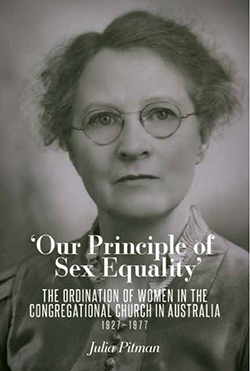Dianne Jensen interviews Rev. Dr Julia Pitman about her new book, Our Principle of Sex Equality, and how the Congregational Church led Australia in the ordination of women.
The Congregational Church is often viewed alongside its partner Methodist and Presbyterian churches as the minor member of the triumvirate which came together to form the Uniting Church in Australia in 1977. Yet this small congregation with English Reformist roots led the way in women’s ordination in Australia and played a key role in defining the shape of the Uniting Church.
‘Our Principle of Sex Equality’: The ordination of women in the Congregational Church in Australia, 1927–1977 (Australian Scholarly Publishing 2016) explores the historical circumstances behind the ordination of Rev. Winifred Kiek in 1927 at the Colonel Light Gardens Congregational Church in South Australia. Rev. Dr Julia Pitman’s book sets the stories of 15 female ministers in the context of the establishment of Congregationalism in Australia, the women’s suffrage movement in wider society and the missionary movement.
Leading the way
Julia’s research highlights the important legacy for the Uniting Church of this partner congregation grounded in Calvinist doctrine and independent polity.
“In Australia, the Congregational Church numbered no more than five per cent of the population in the late 19th century and declined thereafter. It was a tiny, decentralised church. Each congregation was autonomous, meaning that the church meeting of members had final authority over church matters,” says Julia.
“The Uniting Church has been influenced by the Congregational Church in terms of the local autonomy of each church, its concern for gender equality, and its emphasis on mission.
The fact that most Congregations now have their own church council owes much to the concern of Congregationalism that each Congregation should take responsibility for its own life.”
Julia says there were a number of reasons why the Congregational Church led the way on this issue — one which nearly 90 years later continues to divide some Australian churches.
“There was no theological barrier to the ordination of women in the Congregational Church. The church was decentralised, its leaders were theologically liberal and they were aware of precedents for the ordination of women in Congregationalism in America from 1853 and Britain from 1917.”
Share in roles
The Congregational Church saw women’s ordination as part of its response to the call of God to mission in Australia and overseas, says Julia.
“The ordination of women arose from the widespread desire, articulated by men and women church leaders alike, that all church members, regardless of distinctive characteristics such as gender, should take responsibility for the life of the church as they were able.”
“By the 1920s in Australia, there was a small but growing number of theologically educated women who had the sense of calling, educational qualifications and personal capacity to be recognised as ministers in a Protestant church.”
As the three denominations moved towards union 50 years later, the Congregational members of the Joint Commission on Church Union had no question that gender equality would be fundamental to the new church.
“The ordination of women first in Congregationalism in 1927 carried the symbolic meaning that all offices were open to women including chairman or president of the denomination. In church union negotiations, Congregationalists insisted on women’s ordination in the Uniting Church,” says Julia.
The Congregationalists would also leave their stamp upon the Uniting Church’s understanding of itself as a community committed to both inclusion and mission to the wider world, she adds.
“The strong support of the Congregational Church for missionaries of the London Missionary Society based in Asia, the Pacific and Africa has had lasting consequences for the geographic profile of the church in these areas and the Uniting Church as a multi-cultural church.”
Rev. Dr Julia Pitman ministers in Mackay in Queensland and is an Adjunct Research Associate at Charles Sturt University.













